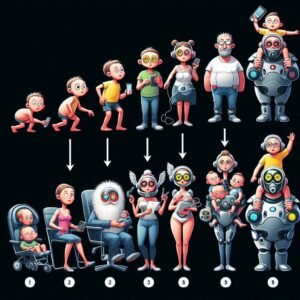
Understanding Consciousness and Awareness in Humans
Consciousness and awareness are pivotal aspects of human existence, influencing our emotional landscape, daily decisions, and overall well-being. At the core of these concepts lies the ability to experience thoughts and feelings, allowing individuals to navigate their environment with intentionality and insight. Consciousness can be described as the state of being aware of and able to think about one’s own existence, sensations, and thoughts. This self-awareness is fundamental to the human experience, as it enables individuals to reflect on their actions, understand their emotions, and engage meaningfully with their surroundings.
Awareness, on the other hand, refers to the capacity to perceive and respond to stimuli, both internally and externally. It encompasses a range of experiences, from the immediate awareness of our sensory experiences—such as sights, sounds, and feelings—to the deeper awareness of our thoughts, memories, and emotions. This multidimensional construct plays a significant role in regulating our emotional responses, facilitating mental clarity, and fostering a sense of connectedness with others.
Contemporary neuroscience and psychology have made significant strides in understanding the mechanisms underlying consciousness and awareness. Research indicates that heightened states of awareness can lead to enhanced emotional regulation, reduced stress, and improved overall happiness. Practices such as mindfulness and meditation demonstrate the profound impact of consciously focusing on the present moment, enabling individuals to cultivate a deeper understanding of their thoughts and feelings. This self-awareness can, in turn, promote resilience in facing life’s challenges and contribute to long-term mental well-being.
The exploration of consciousness and awareness serves as an essential foundation for understanding the potential implications of artificial intelligence (AI) in enhancing these human qualities. By investigating how AI can learn from human emotions and interactions, we can begin to uncover ways in which it may aid in fostering greater awareness and, ultimately, improved well-being in our daily lives.
Can AI Teach Us to Live Happily?
The exploration of artificial intelligence (AI) in promoting individual happiness has become increasingly relevant in today’s technology-driven world. AI can analyze vast amounts of data about human behavior and preferences to provide personalized recommendations aimed at enhancing well-being. By leveraging AI, various platforms and applications can tailor their offerings based on users’ emotional states, allowing for a unique and engaging experience that caters to individual needs.
One prominent example of AI’s role in fostering happiness can be found in meditation and mindfulness applications. Tools like Headspace and Calm utilize AI algorithms to suggest tailored meditation practices that align with the user’s mood and stress levels. By incorporating user feedback and tracking progress over time, these applications can offer personalized experiences that promote relaxation and mental clarity. Furthermore, AI-driven chatbots can engage users in therapeutic conversations, providing emotional support and strategies for managing anxiety or depression, thereby contributing to overall well-being.
However, while AI has tremendous potential in guiding individuals toward happiness, it is essential to acknowledge its limitations. AI lacks the ability to fully grasp the intricacies of human emotions and the subjective nature of happiness. The nuances of personal experiences, cultural contexts, and individual preferences mean that what works for one person may not necessarily resonate with another. Therefore, human interpretive skills remain crucial in utilizing AI-driven insights effectively. Users must engage critically with the recommendations provided by AI and incorporate their own understanding and emotional intelligence into the pursuit of happiness.
In summary, AI has the capability to assist in the journey toward personal happiness by offering tailored guidance and support. While it serves as a valuable tool in promoting well-being, the complexities of human happiness necessitate a balanced approach that emphasizes personal agency and critical engagement alongside technological advancement.
AI as a Tool for Stress Relief
In the contemporary landscape, stress has become a prominent aspect of daily life, leading to an increasing demand for effective coping strategies. Artificial Intelligence (AI) is emerging as a powerful tool in alleviating stress through various applications designed specifically for relaxation and mental well-being. These technologies provide users with innovative solutions for managing anxiety and enhancing overall mental health.
One of the most significant applications of AI in stress relief is virtual therapy. Through sophisticated algorithms, AI-driven platforms can facilitate therapy sessions that mimic in-person interactions. This capability allows individuals to access therapy from the comfort of their homes, reducing barriers to mental health care. Additionally, AI can analyze responses in real-time, offering tailored responses and support, thus making the therapeutic experience more responsive to individual needs.
Furthermore, meditation apps are increasingly utilizing AI technologies to provide users with personalized meditation practices. These applications employ algorithms that track users’ progress and adapt recommendations based on stress levels and preferences. By utilizing data analytics, these tools can guide users toward effective techniques for relaxation, helping them cultivate mindfulness and resilience, which are essential for managing stress.
AI chatbots specifically designed for mental health support are also making significant strides in providing immediate assistance to those in need. These virtual assistants can engage users in conversation, offering coping mechanisms and resources depending on the user’s current emotional state. By ensuring accessibility to mental health support anytime and anywhere, AI chatbots play a crucial role in stress management.
Nevertheless, it is imperative to approach the use of AI in mental health with caution and responsibility. Ethical considerations regarding data privacy, user consent, and potential biases must be taken into account. By prioritizing these principles, we can harness the beneficial aspects of AI while safeguarding individual well-being and ensuring effective stress relief.
Predicting the Future: AI and Emotional Intelligence
As artificial intelligence (AI) continues to evolve, its capacity to understand and interact with human emotions is expected to advance significantly. Emotional AI, a field that focuses on developing systems capable of recognizing and responding to emotional cues, has the potential to transform numerous aspects of our lives. These systems may utilize advanced algorithms and machine learning techniques to analyze vocal tones, facial expressions, and even physiological signals, allowing for more nuanced interpretations of human feelings. With these advancements, we may see AI capable of not only recognizing emotions but also responding in ways that feel empathetic and supportive.
The implications of such technological progress are profound. Enhanced emotional intelligence in AI could lead to improved human-computer interactions in various domains, including mental health support, customer service, and education. For instance, AI-driven applications could offer personalized mental health resources and support tailored to an individual’s emotional state, potentially providing comfort and assistance in times of distress. However, the burgeoning capabilities of emotional AI also raise important ethical concerns, particularly in the realm of privacy. As AI systems become adept at interpreting human emotions, the data collected might encroach upon personal boundaries, leading to debates over consent and the ownership of emotional data.
Moreover, there is the potential risk of emotional dependency on technology. As reliance on emotionally intelligent AI systems grows, individuals may find themselves increasingly turning to these technologies for emotional support, which could diminish the value of human relationships. It is crucial to navigate these challenges diligently, ensuring that while AI advances in understanding human emotions, it does so in a manner that respects individual privacy and fosters genuine human connections. In conclusion, the future of AI in emotional intelligence is ripe with opportunities and challenges that need thoughtful consideration to ensure ethical advancements that prioritize human well-being.


The Path of Zorba the Buddha : Insights from Osho

Celibacy vs Sex Philosophy of Osho

God is Dead?

Navigating Emotional Complexity in Sexual Relations for Spiritual Growth

Osho’s Philosophy: A Cautionary Perspective

The Myth of Superconsciousness: Beyond Sexual Experiences

Misinterpretations of Osho’s Philosophy: The Debate on Sexuality and Spiritual Growth

Celibacy in Religious Traditions and Osho

Osho’s Views on Polygamy and Monogamy

Exploring Osho’s View on Monogamy and Polygamy

The Paradox of Pursuing Travel by Bhagwan Rajneesh

The Global Visa Rejection of Bhagwan Rajneesh

Jesus saves, Moses invests, Bhagwan spends

Third Psychology: Osho’s Influence and Insights

Rajneeshism: Origins and Impact

Thoughtless awareness and contentless consciousness

Osho educational philosophy

Education and Personal Development: The Pathway to a Fulfilling Life

Exploring Osho’s “Ek Onkar Satnam”: A Journey into Spiritual Unity and Inner Truth

Breaking Chains: Osho’s Vision of Spirituality Beyond Guilt and Repression

ओशो के दृष्टिकोण में भाषा और धर्म का संबंध

Exploring the Highlights of ‘Jeevan Ki Khoj’ by Osho

AI and Consciousness and Awareness

Understanding Osho’s Perspective on Govardhan Puja

The Silent Cry of Our Parks: A Plea for Attention

psychedelics and spirituality

Family evolution : From Joint Families to Nuclear Units

Over 80 years old

Intermittent Fasting for Seniors

Can animals Commit Suicide?

Navratri: A Seasonal Transition and Its Significance

8 Types of Intermittent Fasting

Autophagy Fast : Its Benefits and how to achieve

16/8 Fasting: Benefits and Guidelines

36-Hour Fasting: Benefits and Insights

Osho on Guru Nanak

Divine Pleasure: An Inner Journey

Celibacy and Spiritual Enlightenment

Spiritual Journey with Sexual Energy

Culture and Religion,
Share this content: